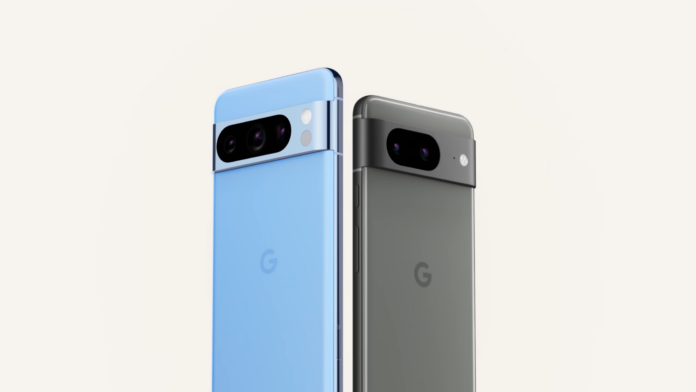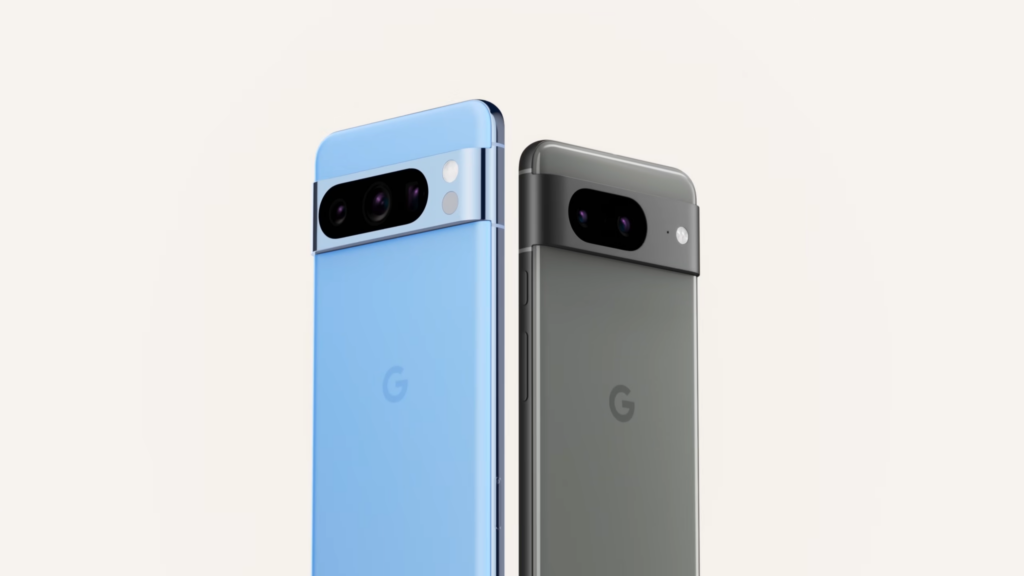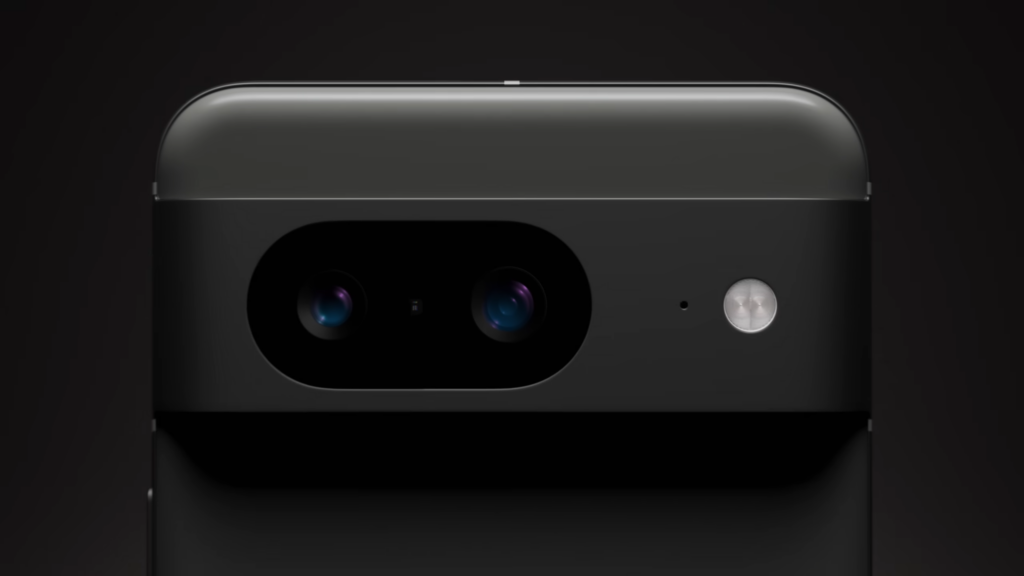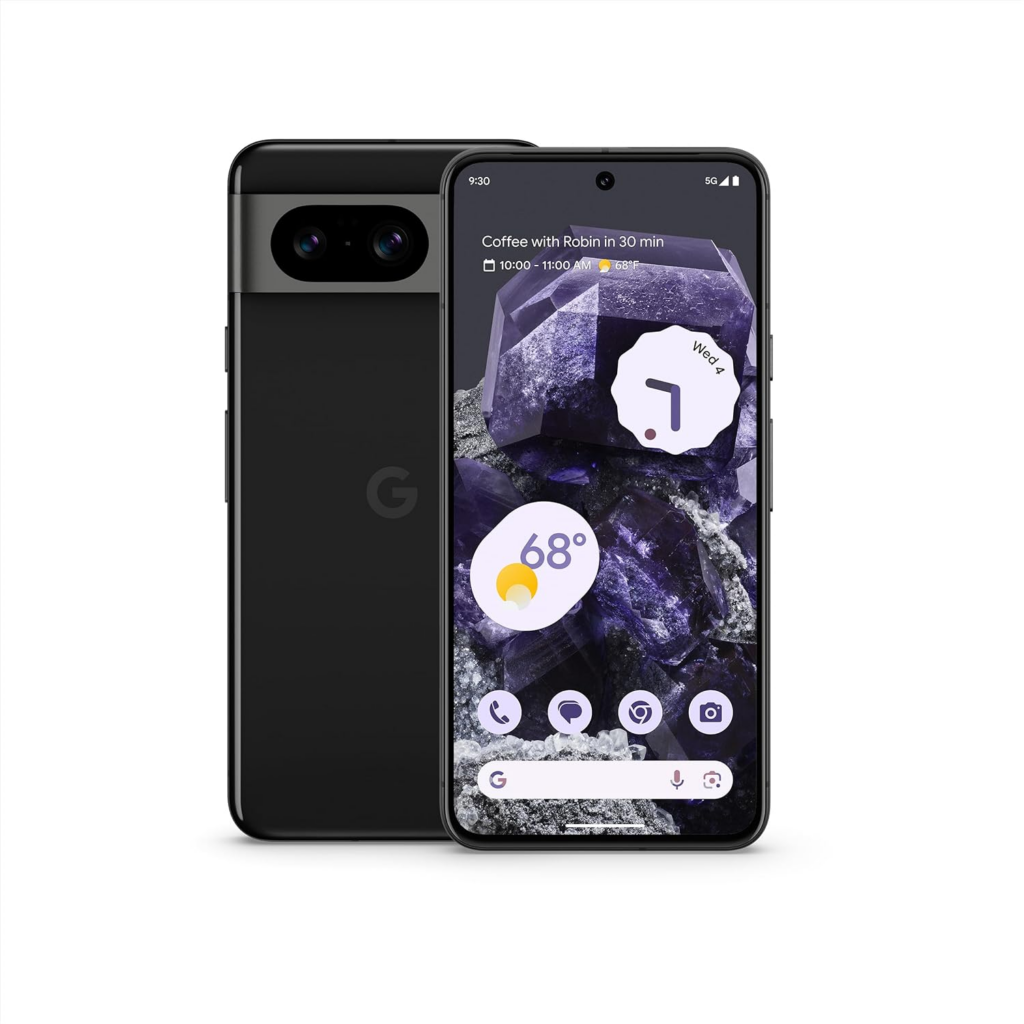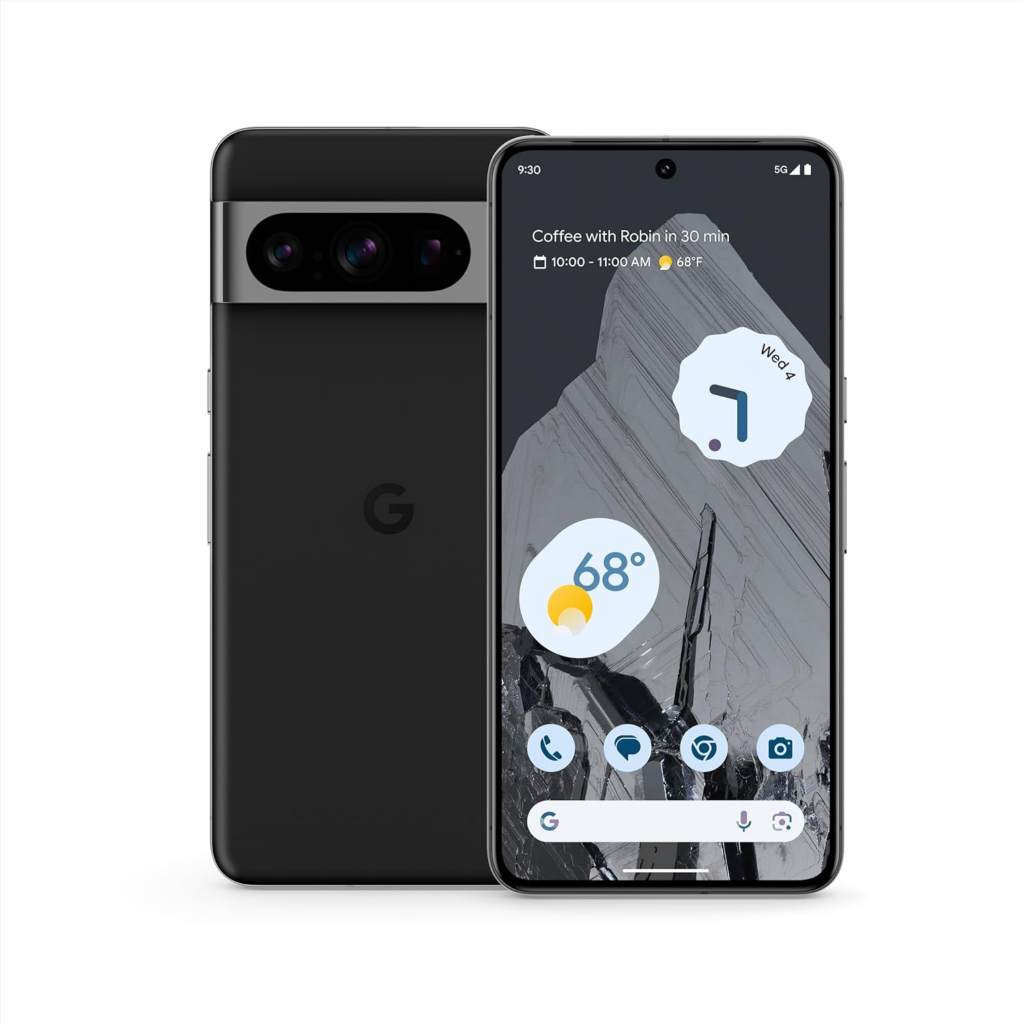Is the Google Pixel 8 Pro’s price justified? Let’s explore.
Google Pixel 8
Specifications:
- Weight: 187g
- Dimensions: 150.5 x 70.8 x 8.9mm
- Screen size: 6.2-inch
- Resolution: 1080 x 2400
- CPU: Tensor G3
- RAM: 8GB
- Storage: 128GB/256GB
- Battery: 4,575mAh
- Rear camera: 50MP+12MP
- Front camera: 10.5MP
The Google Pixel 8 shares many features with the Pixel 8 Pro, such as AI capabilities, a 50MP primary camera, a Tensor G3 chipset, and a 120Hz display. However, it lacks a telephoto camera, and its screen and battery fall short of Google’s flagship.
Pros:
- New Tensor chip
- Refreshed design
- AI camera enhancements
Cons:
- Minor design changes
- Limited camera improvements
- Absence of a temperature sensor
Google Pixel 8 Pro
Specifications:
- Weight: 213g
- Dimensions: 162.6 x 76.5 x 8.8mm
- Screen size: 6.7-inch
- Resolution: 1344 x 2992
- CPU: Tensor G3
- RAM: 12GB
- Storage: 128GB/256GB/512GB/1TB
- Battery: 5,050mAh
- Rear camera: 50MP+48MP+48MP
- Front camera: 10.5MP

The Pixel 8 Pro is Google’s premium offering, excelling in photography and screen quality, albeit at a higher cost than the Pixel 8.
Pros:
- Superior cameras
- Extended battery life
- Exceptionally bright screen
Cons:
- Increased price
- Certain AI features may seem intrusive
- Slightly less potent than competitors
The Google Pixel 8 and Pixel 8 Pro stand out in Google’s 2023 phone lineup, with the Pixel 8 Pro carrying the flagship title and a higher price tag. To determine which is the better investment, let’s delve into their key specifications, in addition to insights from our comprehensive Google Pixel 8 and Pixel 8 Pro reviews.
Google Pixel 8 vs. Google Pixel 8 Pro: Specs Comparison
Before diving into the nitty-gritty of what sets these two phones apart, here’s a quick rundown of their key specifications, for an at-a-glance assessment.
| Feature | Google Pixel 8 | Google Pixel 8 Pro |
|---|---|---|
| Dimensions | 150.5 x 70.8 x 8.9mm | 162.6 x 76.5 x 8.8mm |
| Weight | 187g | 213g |
| Display | 6.2-inch 1080 x 2400 20:9 adaptive OLED | 6.7-inch 1344 x 2992 20:9 adaptive OLED |
| Chipset | Google Tensor G3 | Google Tensor G3 |
| RAM | 8GB (LPDDR5X) | 12GB (LPDDR5X) |
| Storage | 128GB, 256GB (UFS 3.1) | 128GB, 256GB, 512GB, 1TB (UFS 3.1) |
| Rear Cameras | 50MP wide, 12MP ultra-wide | 50MP wide, 48MP ultra-wide, 48MP 5x zoom |
| Front Camera | 10.5MP | 10.5MP |
| Battery | 4,575mAh | 5,050mAh |
| Charging | 27W wired, 18W wireless (2nd-gen Pixel Stand), 12W wireless (Qi) | 30W wired, 23W wireless (2nd-gen Pixel Stand), 12W wireless (Qi) |
| Colors | Obsidian, Hazel, Rose | Obsidian, Porcelain, Bay |
Now, let’s explore the similarities and disparities between these smartphones.
Google Pixel 8 vs. Google Pixel 8 Pro: Price and Availability
Both the Google Pixel 8 and Google Pixel 8 Pro made their debut on October 4, 2023, and are currently on the market.
The Pixel 8 is accessible from $699 / £699 / AU$1,199, offering 128GB storage. Alternatively, a 256GB model is available at $759 / £759 / AU$1,299.
Moving to the Pixel 8 Pro, it kicks off at $999 / £999 / AU$1,699, again with 128GB as the starting storage option. Prices ascend to $1,059 / £1,059 / AU$1,799 for 256GB, $1,179 / £1,179 / AU$1,999 for 512GB, and $1,399 for 1TB, exclusively in the US.
The Pixel 8 Pro’s initial price is $300 / £300 / AU$500 higher than the Pixel 8’s, and this disparity persists when considering the 256GB models. The gap widens significantly when opting for a 512GB or 1TB configuration, as the Pixel 8 doesn’t offer such extensive storage choices.
Google Pixel 8 vs. Google Pixel 8 Pro: Design and Display
Both the Pixel 8 and Google Pixel 8 Pro share resembling designs. They feature a camera visor on the rear, a front punch-hole camera, and an aluminum frame. Additionally, both possess an IP68 rating, ensuring equal resistance to dust and water.
Each phone incorporates a glass back, though the Pixel 8 Pro employs robust Gorilla Glass Victus 2, while the standard Pixel 8 opts for a slightly less robust Gorilla Glass Victus.
A notable visual distinction lies in their color options. The Pixel 8 offers Hazel (green/gray), Obsidian (black), and Rose (pink), while the Pixel 8 Pro is available in Porcelain (white), Obsidian (black), and Bay (blue).
Regardless of color choice, the phones share a silvery camera block. However, the Pixel 8’s block has a matte finish, in contrast to the Pixel 8 Pro’s glossy one. The larger Pixel 8 Pro boasts additional cameras and a temperature sensor, lacking in the standard Pixel 8.
These phones also differ in weight and size. The Google Pixel 8 measures 150.5 x 70.8 x 8.9mm and weighs 187g, whereas the Pixel 8 Pro is bulkier at 162.6 x 76.5 x 8.8mm and heavier at 213g.
Regarding screens, the Pixel 8 offers a 6.2-inch 1080 x 2400 OLED display with 428 pixels per inch, a 120Hz refresh rate, and a peak brightness of 2,000 nits. In contrast, the Pixel 8 Pro boasts a 6.7-inch 1344 x 2992 OLED screen with 489 pixels per inch, a 120Hz refresh rate, and a peak brightness of 2,400 nits.
The Pixel 8 Pro’s screen is larger, higher in resolution, and offers more brightness. While both support a maximum 120Hz refresh rate, the Pixel 8 Pro can scale down to 1Hz, while the standard Pixel 8 drops to only 60Hz. Consequently, the standard phone’s display refreshes more frequently, consuming additional battery.
The Pixel 8 Pro’s display shines, being dubbed “the standout feature” in our Pixel 8 Pro review, comparable to the iPhone 15 Pro Max or possibly even better.
Google Pixel 8 vs. Google Pixel 8 Pro: Cameras
Both Pixel 8 models share a 50MP f/1.7 main camera, yet their secondary cameras differ. The Pixel 8 features a 12MP f/2.2 ultra-wide, while the Pixel 8 Pro boasts a 48MP f/2.0 ultra-wide and a 48MP f/2.8 telephoto with 5x optical zoom. For selfies, both offer a 10.5MP f/2.2 camera, capable of 4K video recording at 60fps.
Notably, the Pixel 8 Pro stands out as the sole device equipped with a telephoto camera, a higher-spec ultra-wide lens, and a pro mode for its camera. It also introduces Video Boost, enhancing video quality through cloud processing, an exclusive feature absent in the standard Pixel 8.
While the Pixel 8 Pro claims the photography crown, both phones deliver impressive camera performance. Our Pixel 8 review noted, “There’s no telephoto sensor, but the cameras that are present are powerful and impressive.”
Google Pixel 8 vs. Google Pixel 8 Pro: Performance
While both the Pixel 8 and Pixel 8 Pro employ a Tensor G3 chipset, the latter gains an edge with 12GB of RAM compared to the Pixel 8’s 8GB. Still, our review found the Pixel 8’s performance respectable.
However, it’s worth noting that neither phone ranks among the most powerful, as the Tensor G3 falls short of the Snapdragon 8 Gen 2 and A17 Pro in competing smartphones.
Google Pixel 8 vs. Google Pixel 8 Pro: Battery
The Pixel 8 boasts a 4,575mAh battery, while the Pixel 8 Pro offers a larger 5,050mAh one, compensating for its bigger screen.
Both phones claim 24 hours or more with regular usage and up to 72 hours using Extreme Battery Saver mode. In our tests, both phones lasted all day, but the Pixel 8 Pro did so more comfortably.
The Pixel 8 Pro also charges slightly faster than the Pixel 8 at 30W compared to 27W, with wireless charging at 23W versus 18W when using the Google Pixel Stand (2nd gen).
Google Pixel 8 vs. Google Pixel 8 Pro: Verdict
The Pixel 8 Pro outshines the standard Pixel 8 in multiple aspects, with an additional optical zoom lens, a better ultra-wide sensor, more RAM, and a larger battery for improved life and faster charging. It offers a larger, brighter, and higher-resolution screen, along with enhanced durability thanks to Gorilla Glass Victus 2.
However, it comes at a higher price and is larger and heavier. The base model of the Pixel 8 provides most of the Pro’s features at a lower cost and in a more compact size. Both models promise an impressive seven years of software updates, making them top choices among Pixel phones, with the Pixel 8 Pro taking the lead.

